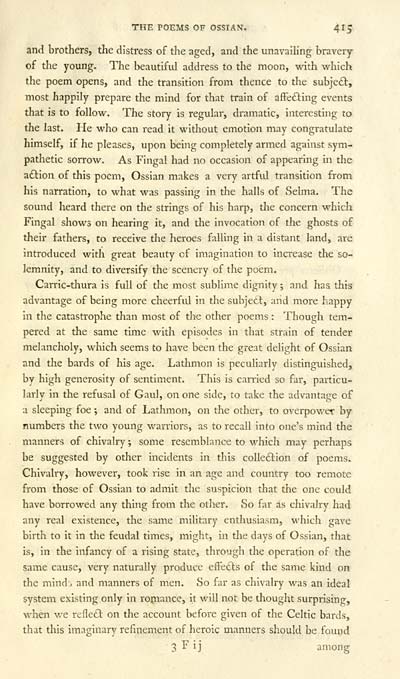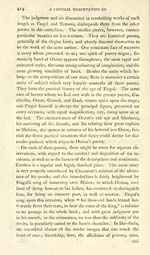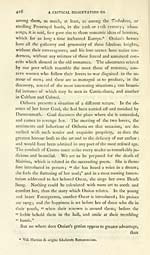Download files
Complete book:
Individual page:
Thumbnail gallery: Grid view | List view

THE POEMS OF OSSIAN. 415
and brothers, the distress of the aged, and the unavailing bravery
of the young. The beautiful address to the moon, with which
the poem opens, and the transition from thence to the subjeft,
most happily prepare the mind for that train of afFefting events
that is to follow. The story is regular, dramatic, interesting to
the last. He who can read it without emotion may congratulate
himself, if he pleases, upon being completely armed against sym-
pathetic sorrow. As Fingal had no occasion of appearing in the
a£tion of this poem, Ossian makes a very artfiU transition from
his narration, to what was passing in the halls of Selma. The
sound heard there on the strings of his harp, the concern which
Fingal shows on hearing it, and the invocation of the ghosts of
their fathers, to receive the heroes falling in a distant land, are
introduced with great beauty of imagination to increase the so-
lemnity, and to diversify the scenery of the poem.
Carric-thura is full of the most sublime dignity ; and has this
advantage of being more cheerful in the subje£l, arid more happy
in the catastrophe than most of the other poems : Though tem-
pered at the same time with episodes in that strain of tender
melancholy, which seems to have been the great delight of Ossian
and the bards of his age. Lathmon is peculiarly distinguished,
by high generosity of sentiment. This is carried so far, particu-
larly in the refusal of Gaul, on one side, to take the advantage of
a sleeping foe ; and of Lathmon, on the other, to overpov/er by
numbers the two young warriors, as to recall into one's mind the
manners of chivalry ; some resemblance to which may perhaps
be suggested by other incidents in this collection of poems.
Chivalry, however, took rise in an age and country too remote
from those of Ossian to admit the suspicion that the one could
have borrowed any thing from the otlier. So far as chivalry had
any real existence, the same military enthusiasm, which gave
birth to it in the feudal times, might, in the days of Ossian, that
is, in the infancy of a rising state, through the operation of the
same cause, very naturally produce efFedts of the same kind on
the mindj and manners of men. So far as chivalry was an ideal
system existing only in ropiance, it will not be thought surprising,
when v/e refle£t on the account before given of the Celtic bards,
that this imaginary refinement of heroic manners should be found
3 F ij anions
and brothers, the distress of the aged, and the unavailing bravery
of the young. The beautiful address to the moon, with which
the poem opens, and the transition from thence to the subjeft,
most happily prepare the mind for that train of afFefting events
that is to follow. The story is regular, dramatic, interesting to
the last. He who can read it without emotion may congratulate
himself, if he pleases, upon being completely armed against sym-
pathetic sorrow. As Fingal had no occasion of appearing in the
a£tion of this poem, Ossian makes a very artfiU transition from
his narration, to what was passing in the halls of Selma. The
sound heard there on the strings of his harp, the concern which
Fingal shows on hearing it, and the invocation of the ghosts of
their fathers, to receive the heroes falling in a distant land, are
introduced with great beauty of imagination to increase the so-
lemnity, and to diversify the scenery of the poem.
Carric-thura is full of the most sublime dignity ; and has this
advantage of being more cheerful in the subje£l, arid more happy
in the catastrophe than most of the other poems : Though tem-
pered at the same time with episodes in that strain of tender
melancholy, which seems to have been the great delight of Ossian
and the bards of his age. Lathmon is peculiarly distinguished,
by high generosity of sentiment. This is carried so far, particu-
larly in the refusal of Gaul, on one side, to take the advantage of
a sleeping foe ; and of Lathmon, on the other, to overpov/er by
numbers the two young warriors, as to recall into one's mind the
manners of chivalry ; some resemblance to which may perhaps
be suggested by other incidents in this collection of poems.
Chivalry, however, took rise in an age and country too remote
from those of Ossian to admit the suspicion that the one could
have borrowed any thing from the otlier. So far as chivalry had
any real existence, the same military enthusiasm, which gave
birth to it in the feudal times, might, in the days of Ossian, that
is, in the infancy of a rising state, through the operation of the
same cause, very naturally produce efFedts of the same kind on
the mindj and manners of men. So far as chivalry was an ideal
system existing only in ropiance, it will not be thought surprising,
when v/e refle£t on the account before given of the Celtic bards,
that this imaginary refinement of heroic manners should be found
3 F ij anions
Set display mode to: Large image | Transcription
Images and transcriptions on this page, including medium image downloads, may be used under the Creative Commons Attribution 4.0 International Licence unless otherwise stated. ![]()
| Early Gaelic Book Collections > Ossian Collection > Poems of Ossian, the son of Fingal > (427) |
|---|
| Permanent URL | https://digital.nls.uk/77928454 |
|---|
| Description | Selected books from the Ossian Collection of 327 volumes, originally assembled by J. Norman Methven of Perth. Different editions and translations of James MacPherson's epic poem 'Ossian', some with a map of the 'Kingdom of Connor'. Also secondary material relating to Ossianic poetry and the Ossian controversy. |
|---|
| Description | Selected items from five 'Special and Named Printed Collections'. Includes books in Gaelic and other Celtic languages, works about the Gaels, their languages, literature, culture and history. |
|---|

